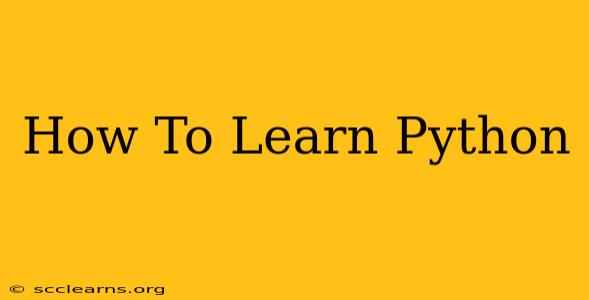Python, renowned for its readability and versatility, has become one of the world's most popular programming languages. Whether you're aiming to build websites, analyze data, or delve into artificial intelligence, learning Python is a valuable skill. This comprehensive guide will walk you through the essential steps to mastering this powerful language.
Getting Started: Your First Steps in the Python World
Before diving into complex concepts, you need the right tools. First, download and install Python. The official Python website provides clear instructions for your operating system (Windows, macOS, or Linux). Once installed, you can choose your preferred Integrated Development Environment (IDE) or code editor. Popular choices include:
- VS Code: A free, versatile code editor with excellent Python support and extensions.
- PyCharm: A powerful IDE, available in both free (Community Edition) and paid (Professional Edition) versions.
- Thonny: A simpler IDE, ideal for absolute beginners.
Your First Python Program: "Hello, World!"
Traditionally, learning any programming language begins with the "Hello, World!" program. In Python, it's incredibly simple:
print("Hello, World!")
This single line of code uses the built-in print() function to display text on your console. Run this code in your chosen IDE; you'll see "Hello, World!" appear, confirming your successful Python installation.
Mastering the Fundamentals: Core Python Concepts
Now that you've taken your first steps, let's explore core Python concepts:
1. Data Types: The Building Blocks of Your Programs
Python supports various data types, including:
- Integers (int): Whole numbers (e.g., 10, -5, 0).
- Floating-point numbers (float): Numbers with decimal points (e.g., 3.14, -2.5).
- Strings (str): Sequences of characters (e.g., "Hello", 'Python').
- Booleans (bool): True or False values.
2. Variables: Storing and Manipulating Data
Variables are used to store data. Python uses a simple assignment operator (=):
name = "Alice"
age = 30
3. Operators: Performing Calculations and Comparisons
Python offers a wide range of operators for arithmetic, comparison, and logical operations. Examples include:
+,-,*,/(arithmetic)==,!=,>,<,>=,<=(comparison)and,or,not(logical)
4. Control Flow: Making Decisions in Your Code
Control flow statements allow you to control the execution of your program based on conditions:
if,elif,elsestatements: Used for conditional execution.forloops: Used for iterating over sequences.whileloops: Used for repeating a block of code as long as a condition is true.
5. Functions: Modularizing Your Code
Functions are reusable blocks of code that perform specific tasks. They improve code organization and readability.
def greet(name):
print(f"Hello, {name}!")
greet("Bob") # Output: Hello, Bob!
Level Up: Expanding Your Python Skills
Once you've grasped the fundamentals, consider exploring these advanced topics:
- Object-Oriented Programming (OOP): Learn about classes, objects, inheritance, and polymorphism.
- Data Structures: Master lists, dictionaries, tuples, and sets.
- File Handling: Learn how to read and write data to files.
- Modules and Packages: Explore Python's extensive library of modules and packages.
- Working with External Libraries: Familiarize yourself with popular libraries like NumPy, Pandas, and Matplotlib for data science and visualization.
Resources for Learning Python
Numerous resources are available to aid your Python learning journey:
- Online Courses: Platforms like Codecademy, Coursera, edX, and Udemy offer structured Python courses for all skill levels.
- Interactive Tutorials: Websites such as Learn Python.org provide interactive tutorials.
- Documentation: The official Python documentation is a comprehensive resource.
- Books: Many excellent Python books cater to beginners and advanced learners.
- Online Communities: Engage with the Python community through forums and online groups to ask questions and share your progress.
Conclusion: Embrace the Python Journey
Learning Python is a rewarding experience. By starting with the fundamentals, practicing consistently, and utilizing available resources, you'll steadily build your skills and unlock the power of this versatile language. Remember that consistent practice and tackling projects are key to truly mastering Python. So, start coding, and happy learning!

